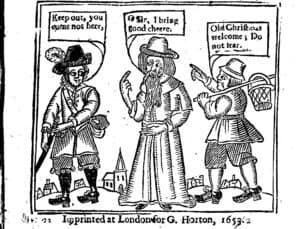 To admit my own mixed family history (including being fair to my mother, a gentle royalist), one of our ancestors actually preached the Restoration sermon for the last King Charles of England in Gloucester Cathedral (I have a copy). What is particularly interesting about him is that he was one of the few pre-Civil War clergy who survived as a parish priest (in the Cotswolds) through all the upheavals of the 1630s-1660s, and (unlike the fabled Vicar of Bray) was clearly held in continuing high esteem - despite being hauled before Presbyterian and Congregationalist inquiries (including the Parliamentary Committee which dismissed errant Ministers) whilst also coming under some attack from ultra-royalists/episcopalians. Maybe having run-ins with church structures, and being attacked from various different quarters, is in my blood?!...
1 Comment
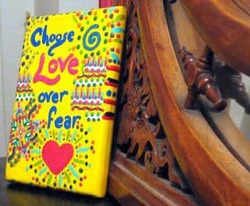 A word re current Lambeth Conference happenings - but it applies to many others too… I’ve always struggled with many faith labels people have tried to stick on me but I’ll still accept ‘ecumenical’ - in the true, big, sense of ‘the whole inhabited earth’, ‘justice, peace and the integrity of creation’, seeking and honouring beauty, truth and goodness wherever it can be found and nurtured, and building on the extraordinary depth of ‘ecumenical grammar’, spiritual nuance and deep relationships developed in the past - and I remain passionately committed to working with anyone who seeks that, whatever label, culture or tradition. That’s been part of the joy of my ecumenical - and interfaith - journeys: discovering others (from Catholics to Pentecostals, Muslims to Wiccans, deep souled Orthodox and big hearted Evangelicals , and those who eschew any ‘faith’ identification). Such people give meaning to the true ‘oneness, holiness, apostolicity, and catholicity’ which others bleat on about but too often only use to bruise and beat up others. Today’s Christian institutional formulations are so typically small, fearful and self-absorbed in that respect - so no wonder we continuing ecumeniacs struggle to be heard. It saddens me that Churches have so little interest in real growth (in humanity and spirituality - not institutional numbers, boundaries and ‘resolutions’) and so neglect the ways forward that ‘receptive’ ecumenists have sought to share - asking not what we can get accepted by others, but what gifts of ‘the other’ (especially the marginal and ostracised ‘other’) we desperately need for our own growth and our mutual survival, never mind flourishing, on this fragile threatened planet. I know that in every great faith tradition - and not least in the Anglican ones I know best (including some fine bishops now at Lambeth) - that others share my feelings and seek to live faith more abundantly. May we keep such faith and join our hearts and hands with those who also share that vision, wherever they be and come from, choosing love not fear. 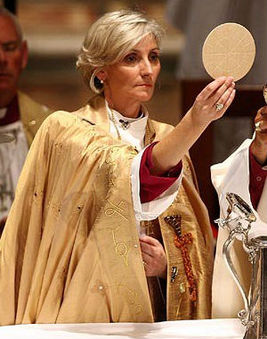 In its remarkably unhelpful article on the Church of England's belated decision to move for female bishops, Catholic Online (15/7/14) makes one of those knee-jerk denominational reactions which do little credit to the wisdom of its own tradition, never mind the complex truth and relationships of ecumenical life. As a leading Roman Catholic communication channel, it is a disappointing response and one which must, at the very least, make many Catholics cringe. Whilst the article rightly raises the ecumenical challenge contained in the emergence of female bishops in the Anglican Communion, it vastly overstates the continuing divisions, ignores the nuances and other positive dynamics of Roman Catholic ecumenism, and, above all, fails to understand that the journey of Christian unity is not a one-way street. Perhaps, like other instinctive Christian reactionaries, the author feels a sense of betrayal as the Church of England stumblingly implements a very Catholic principle of doctrinal development to help ensure historic Christianity remains credible and alive in the changed context of the contemporary world... 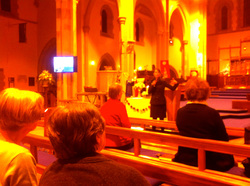 As part of the Toowoomba Churches Together marking of the Week of Prayer for Christian Unity, Toowoomba Ecumenical Environmental Network held a vigil prayer on the evening of 4 June in St Luke's for World Environment Day. We were joined by Emily Gentle, a local resident whose family still live in Kiribati. She spoke movingly about the challenges faced by Kiribati, not least those of climate change upon such a vulnerable Pacific community. This brought home to us the realities of small island states which are the focus of the UN's World Environment Day this year. In the words of the collect I wrote for Angligreen this year, may we therefore act and pray: Holy God, source of all life and unity, we give you thanks for the gifts of the small islands and oceans of our world. As the Holy Spirit moves upon the waters of new life, grant that we too may share in your renewing love, hearing the groans of creation and raising our voices in solidarity, that your will may be done, and all creation share in the waves of your embrace. This we ask in the name of Jesus Christ, through whom all things are reconciled. Amen. 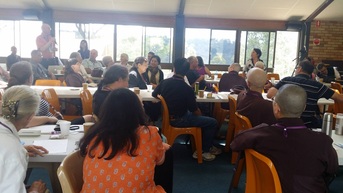 'Are preaching and doctrine really barriers to peace and multi-faith harmony?' Awkward questions are uncomfortable to ask, even in congenial gatherings. Yet some are also necessary. For every group has places where it prefers not to go, despite its ultimate health depending on doing so. This is true for multi-faith groups, as it is for church and other groups. For multi-faith groups too can sometimes begin to build walls they do not realise they are creating. Last Saturday's otherwise excellent Interfaith Forum in Toowoomba was a case in point. I felt awkward demurring at the groups' discussion feedback (see photo above) but I felt something needed to be said. For, among many very helpful and constructive ideas for moving forward, up came the old chestnuts that 'we should not preach' and that 'we should avoid doctrine and just share love'. Well, yes, and no... The damage done, over the centuries, to human relationships by bad or misdirected preaching and by mishapen doctrinal assertion and conflict is incalculable. Today, hopefully, most of us are ever more sensitive to of the pain and disharmony which can be caused. There are times and places, ways and styles, which are more or less appropriate. In some areas, such as in what ecumenical and inter-religious scholars call 'the dialogue of life' and the 'dialogue of action', preaching and doctrine may be particularly important to play down. Within multi-faith and many secular settings, there are also people who have been so hurt by bad religion that we need to give priority to gentleness and restraint in communication of our own personal inspirations. Yet without doctrine we lose both the dynamism which leads to genuine unity and harmony and also the will and openness to truth upon which such unity and harmony depends. 'Love unites, doctrine divides' is certainly a popular contemporary slogan. It is even heard sometimes within otherwise informed ecumenical circles. Partly, the aversion is a case of language. Today, both preaching and doctrine smack to many of olde worlde, as well as troubling, times. It is possible indeed that such words may one day be beyond recall, in the same way that the word dogma (understood as 'non-negotiable, incontrovertible' doctrine) is pretty much taboo. Yet they are so much part of our human religious fabric, especially within Christian circles, that rehabilitation would be a better option. After all, the reality is that everyone has doctrines. Buddhists, and some others, call them 'teachings' but they are the same thing. 'Love unites, doctrine divides' is indeed (a somewhat amorphous) one of these for some. Apart from pointing out that a significant part of my life has been, and is still, given over to preaching, my own sense is that disdain for preaching is based on bad experience or misconception. After all, one of the greatest peacemakers of my lifetime was Martin Luther King Jnr, who was a preacher in word, deed, and essential personality. You could no more take the preacher out of him than you could take his passion for peace and justice, love and harmony. For these were all one, grounded in his love and experience of God in Jesus Christ. So to reject preaching, in the best sense of the word, in all circumstances, is to reject one of the distinctive charisms of Christianity (and also, to some extent, those of Islam and some other faiths). It would certainly do little to endear multi-faith discussion and relationships to many Christians for whom this is part of their lifeblood, not as a weapon towards others but as a means of grace for all. What matters is how we preach and teach. Graciously, on Saturday, this concern was heard by others. For at the heart of our journeying with others of other faith, and none, is respect for the inner integrity of one another and what shapes us for good. Doctrine itself is a vital matter for ecumenical and inter-religious as well as confessional and intra-religious life. For it is a tool which can be used to help us grow together, as well as being a potential, and well proven, weapon of division. As with other things in religion, it is a case of how it is used. Is it a barrier to protect us against others or a freeing pathway upon to which walk? Is it used for the glory of God and for human self and mutual understanding or for self or group aggrandisement? Is it a means to learn and grow, written on our hearts and in our souls rather than in proscriptions of others? Ultimately every doctrine is, even at its very best, but a symbol of eternal love. We must always be wary therefore of overstepping the mark in our own doctrinal exploration and affirmation. Yet, even when we fail to comprehend them, the greatest doctrines of faith, as genuine symbols of God's love, can be for us means of grace and revelation. As such, they cannot simply be laid aside in multi-faith relationship. They are too important for that. As the ecumenical journey has shown, 'Life and Work' concerns must proceed hand in hand with 'Faith and Order' dialogue. Sometimes love is best expressed just in presence, care and service. Intertwined and underlying however are always our understandings of love. It is a matter of our human intellectual responsibility to complement and deepen our feelings of well-being towards others. If we never wrestle with what helps and what hinders we will fail to grow in love and we will hold back our gifts of, albeit glimpsed, understanding from one another. For as G. K. Chesterton (in What's Wrong with the World?) once said: 'creeds are always in collision. Believers bump into each other; whereas bigots keep out of each others’ way.' |
AuthorJo Inkpin is an Anglican priest serving as Minister of Pitt St Uniting Church in Sydney, a trans woman, theologian & justice activist. These are some of my reflections on life, spirit, and the search for peace, justice & sustainable creation. Archives
July 2024
Categories
All
|
 RSS Feed
RSS Feed